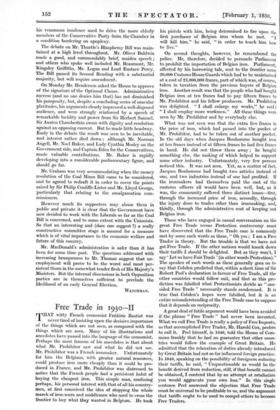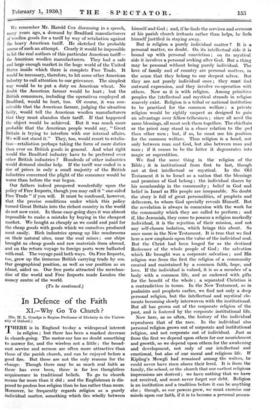Free Trade in 1930-11 T HAT witty French economist Frederic B.astiat was
never tired of insisting upon the decisive importance of the things which are not seen, as compared with the things which are seen. Many of his illustrations and anecdotes have passed into the language of the economist. Perhaps the most famous of his anecdotes is that about what Mr. Prohibitor saw and what he did not see. Mr. Prohibitor was a French ironmaker. Unfortunately for him the Belgians, with greater _ natural resources, could produce iron more cheaply than it could be pro- duced in France, and Mr. Prohibitor was distressed to notice that the French people had a persistent habit of buying the cheapest iron. This simple man, confusing perhaps, his personal interest with that of all his country- men, at first conceived the idea of stopping the whole march of iron-users and middlemen who used to cross the frontier to buy what they wanted in Belgium. He took his pistols with him, being determined to fire upon the first purchaier of Belgian iron whom he met. ‘, will kill him," he said, • " in order to teach him how to live."
On second thoughts, however, he remembered the police. He, therefore, decided to persuade Parliament to prohibit the importation of Belgian iron. Parliament, affected by his harrowing tale, sent to the frontier some 20,000 Customs House Guards which had to be maintained at a cost of 25,000,000 francs, part of which was, of course, taken in taxation from the previous buyers of Belgian iron. Another result was that the people who had bought Belgian iron at ten francs had to pay fifteen francs to Mr. Prohibitor and his fellow producers. Mr. Prohibitor was delighted. " I shall enlarge my works," he said ; " I shall employ more workmen." All these things were seen by Mr. Prohibitor and by everybody else.
What was not seen was that the extra five francs in the price of iron, which had passed into the pocket of Mr. Prohibitor, had to be taken out of another pocket.
In the old days when Jacques Bonhomme bought iron at ten francs instead of at fifteen francs he had five francs in hand. He did not throw them away ; he bought something else, the making of which helped to support some other industry. Unfortunately, very few persons noticed this. It was not seen. Yet, as a matter of fact, Jacques Bonhomme had bought two articles instead of one, and two industries instead of one had profited. If the ironmakers had themselves paid the cost of the customs officers all would have been well, but, as it was, the community suffered, three distinct losses—first, through the increased price of iron, secondly, through the injury done to trades other than ironmaking, and, thirdly, through the administrative cost of keeping out Belgian iron.
Those who have engaged in casual conversation on the great Free Trade versus Protection controversy must have discovered that the Free Trade case is commonly met by some such words as these, " Oh yes ; I am a Free Trader in theory. But the trouble is that we have not got Free Trade. If the other nations would knock down their tariffs I should be delighted. But as they won't, I say ' Let us have Fair Trade ' (in other words Protection)."
The speaker of such words as these generally goes on to say that Cobden predicted that, within a short time of Sir Robert Peel's declaration in favour of Free Trade, all the other countries would follow suit, and that as this pre- diction was falsified what Protectionists deride as " one- sided Free Trade " necessarily stands condemned. It is true that Cobden's hopes were falsified, but it is an entire misunderstanding of the Free Trade case to suppose that it depends on reciprocity.
A great deal of futile argument would have been avoided if the phrase " Free Trade " had never been invented.
What. we call Free Trade is really a policy of Free Imports, as that accomplished Free Trader, Mr. Harold Cox, prefers to call it. Peel himself, in 1848, told the House of-Com- mons frankly that he had no guarantee that other coun- tries would follow the example of Great Britain. He admitted that the relaxation of duties already introduced by Great Britain had not so far influenced foreign practice.
In 1849, speaking on the possibility of foreigners reducing their tariffs, he said, " Unquestionable as would be the benefit derived from reduction, still, if that benefit cannot be nbtained, I contend that by an attempt at retaliation you would aggravate your own loss." In this single sentence Peel answered the objection that Free Trade must be universal to-be profitable to us, and the-argument that tariffs ought to be used to compel others to become Free Traders. We remember Mr. Harold Cox discussing in a speech, many years ago, a demand by.Bradford manufacturers of woollen goods for a tariff by way of retaliation against the heavy American tariff. He sketched the probable course of such an attempt. Clearly it would be impossible to hit the real "authors of this particular American tariff— the American woollen manufacturers. They had a safe and large enough market in the huge world of the United States inside which there is complete Free Trade. It would be necessary, therefore, to hit some other American industry to call attention to our grievance. The simplest way would be to put a duty on American wheat. No doubt the American farmer would be hurt ; but the British consumers, including the operatives employed at Bradfoid, would be hurt, too. Of course, it was con- ceivable that the American farmer, judging the situation fairly, would tell the American woollen manufacturers that they must abandon their tariff. If that happened the object would be achieved. But it was much more probable that the American people would say, " Great Britain is trying to interfere with our internal affairs. We will not stand it." They, too, would resort to retalia- tion—retaliation perhaps taking the form of more duties than ever on British goods in general. And what right would the Bradford industry have to be preferred over other British industries ? Hundreds of other industries would demand similar help. If the tariff war ended in a rise of .prices in only a small majority of the British industries concerned the plight of the consumer would be worse than before the war began.
Our fathers indeed prospered wonderfully upon the policy of Free Imports, though you may call it " one-sided Free Trade " if you will. It must be confessed, however, that the precise conditions under which this policy turned Great Britain into the richest country in the world do not now exist. In those easy-going days it was almost impossible to make a mistake by buying in the cheapest market. We bought as cheaply as we could and paid for the cheap goods with goods which we ourselves produced most easily. Rich industries sprang up like mushrooms on their natural sites, near the coal mines ; our ships brought us cheap goods and raw materials from abroad, and on the return voyage to foreign ports were ballasted with coal. The voyage paid both ways. On Free Imports; too, grew up the immense British carrying trade by sea. Our geographical position, as well as our position as an island, aided us. Our free ports attracted the merchan- dise of the world and Free Imports made London the money centre of the world.
(To be continued.)







































 Previous page
Previous page